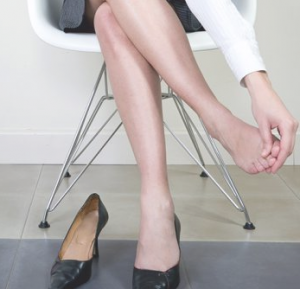St. Elizabeth Healthcare
Many women prefer fashion over function. You squeeze your feet into your three-inch stilettos to look great in your little black dress. Or wear pumps to work every day to look more polished in your suit. But have you stopped to consider you could be doing lasting damage to your feet?
Dr. James Morrow and Dr. Bill Shamsi, Podiatrists with St. Elizabeth Physicians, agree that while high heels may look cute, there are several injuries they could cause.
1. Foot and toe pain — The angle a high-heel shoe puts your foot in could cause short-term or even chronic pain. Dr. Morrow says, “The influence of heel height can lead to pain and burning in the ball of the foot. It can also cause chronic pain in the toe, called metatarsalgia.” The stress of having your foot in an abnormal position for long periods of time, particularly a poorly fitted shoe, can lead to painful bunions or hammertoes and increase the chances of injury.

2. Knee pain — Most high heel shoes do not offer the shock absorption you need when walking the hallways at work. Dr. Shamsi says, “This stops your foot from rotating naturally as you walk, and places more stress on your knees with each step.”
3. Ankle sprain — Having your foot in a flexed position for extended periods of time every day can also weaken your ankle joint. Dr. Shamsi explains, “The weakened ankle makes you more susceptible to roll the ankle joint. We typically see inversion sprains from high heels.”
4. Toe Fractures — A weakened ankle can lead to sprains and increase your risk for fractures to the toes or the fifth metatarsal bone.
5. Ligament damage — If you suffer repetitive ankle sprains and a weakened ankle from wearing high heels, you could damage a very important ligament that helps you stabilize your ankle joint. Dr. Morrow says, “There is a ligament in your foot called the anterior talofibular ligament. Repeatedly spraining your ankle can lead to lateral ankle instability in your ankle from a weakening of this ligament.” If you develop this weakening, you may have to wear a brace, see a physical therapist or have surgery.
6. Shortened Achilles tendon — If you wear high-heel shoes every day to work over years, you could also develop issues with your Achilles tendon. Dr. Morrow explains, “High heels can reshape your calf muscle and stiffen the Achilles tendon, which connects your calf muscle to the bone. It is a slow process, but it is seen in people who wear heels over a long period.”
7. Bunions — Some people are already genetically susceptible to forming a bunion and wearing a high heel shoe can hasten the development of a bunion. Dr. Shamsi says, “The shape of the shoe puts more pressure on the ball of your foot. The higher the heel, the more pressure.”
How to Reduce Your Risk of Foot Injury from High Heels
Dr. Shamsi and Dr. Morrow agree more research could be done on the impact wearing high heels for short and long periods of time have on the feet. They recommend you listen to your feet—if your feet hurt, change out of your heels.
They also recommend:
▪ Choose a proper heel – the heel should be a moderate height and wide. The toe box of the shoe should have adequate space for your toes to move.
▪ Improve your core strength — a strong core gives you added strength in your lower extremities and will help with balance.
▪ Wear appropriate shoes for terrain — if you will be on grass, cobblestone, or on an uneven surface, a lower heel will help your ankle stay stabilized.
▪ Change your shoes throughout the day—have a second pair of shoes with you that are flat, so when your feet start to feel the effects of the high heel, you can give your toes and ankles a rest.
▪ Wear the correct size — have your shoes fitted properly. If the shoes are too small or too large, you run the risk of hurting your feet. Your toes or heel should not be off the end of the shoe. If you shop online, make sure the store has a generous return policy so you can return them and get the right size.
Dr. Morrow also emphasizes moderation, “Make sure you are changing your shoes and not wearing high heels every day, all day long.”
If you are suffering from foot pain or get a sudden foot injury, the podiatrists at St. Elizabeth Physicians are accepting new patients. If you suffer a trauma or fracture of your foot, same-day and next-day appointments are available. To make an appointment call (850) 737-7900.
















